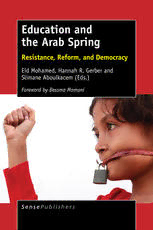
Education and the Arab Spring: Resistance, Reform, and Democracy PDF
Preview Education and the Arab Spring: Resistance, Reform, and Democracy
Education and the Arab Spring Education and the Arab Spring Resistance, Reform, and Democracy Foreword by Bessma Momani Edited by Eid Mohamed Doha Institute for Graduate Studies, Qatar University of Guelph, Canada Hannah R. Gerber Sam Houston State University, USA and Slimane Aboulkacem Sam Houston State University, USA A C.I.P. record for this book is available from the Library of Congress. ISBN: 978-94-6300-469-5 (paperback) ISBN: 978-94-6300-470-1 (hardback) ISBN: 978-94-6300-471-8 (e-book) Published by: Sense Publishers, P.O. Box 21858, 3001 AW Rotterdam, The Netherlands https://www.sensepublishers.com/ All chapters in this book have undergone peer review. Printed on acid-free paper All Rights Reserved © 2016 Sense Publishers No part of this work may be reproduced, stored in a retrieval system, or transmitted in any form or by any means, electronic, mechanical, photocopying, microfilming, recording or otherwise, without written permission from the Publisher, with the exception of any material supplied specifically for the purpose of being entered and executed on a computer system, for exclusive use by the purchaser of the work. To my father Ahmed Abdelwahab Mohamed who passed away a couple of years ago. He taught me the value of education. – Eid To Selma and Mostafa, youth who have unknowingly encouraged me to think through the shifting norms of education and democracy in the Egyptian context. – Hannah To my father’s soul, Messaoud Aboulkacem, and my beloved mother, Khedidja. They believe good education can better the world. They have always inspired me to value education and strive to spread it. – Slimane TABLE OF CONTENTS Foreword ix Bessma Momani Preface xi Acknowledgments xiii Chapter Abstracts xv Education, Democracy, and the Arab Spring: An Introduction xix Slimane Aboulkacem, Hannah R. Gerber and Eid Mohamed Section One: Classroom Issues and Teacher Professional Development Struggles Post-Arab Spring 1. Teaching for Democracy in Post-Arab Spring: Challenges & Opportunities 3 Abdullah F. Alrebh and Radhi Al-Mabuk 2. Arab Spring and Teacher Professional Development in Egypt: A Case Study 25 Nahed Abdelrahman and Beverly J. Irby Section Two: Youth Education and the Seeds of Social Change 3. Democracy as Student Mobilization: How Student Unions Struggle for Change in Egypt 51 Ahmed Abd Rabou 4. Vulnerability of the Tunisian Education System: A Pendulum Swing between Reality and Hope 69 Fadwa Bouguerra and Slimane Aboulkacem 5. Youth & Revolution: A Call to Reform Higher Education in Yemen 83 Waleed F. Mahdi and Abdulghani A. Al-Hattami Section Three: Ideologies, Religion, and Education after the Arab Spring 6. Higher Education and Contestation in the State of Kuwait after the Arab Spring: Identity Construction & Ideologies of Domination in the American University of Kuwait 97 Bader Mousa Al-Saif and Haneen Shafeeq Ghabra vii TABLE OF CONTENTS 7. Non-Muslim Students and Religious Education in Egyptian Classrooms 115 Hyun Jeong Ha 8. Al-Azhar: The Challenge of Reforming Religious Education in Egypt 129 Said F. Hassan About the Contributors 151 Index 157 viii BESSMA MOMANI FOREWORD The Arab world is at a crucial turning point. The Arab region has one of the most youthful populations in the world, a rising class of educated young people, an increasingly connected society to technology, social media, and online opportunities. Yet, the Arab region remains stuck repeating old teaching pedagogy of rote learning. To turn the region around, deep reforms in education delivery and political institution are needed. In an aptly titled volume, Mohamed, Gerber, and Aboulkacem explore education in the Middle East and North Africa region after the Arab Spring and how this is an important step toward democracy. The Arab region has made considerable progress toward post-secondary education in the Middle East and North Africa. Throughout the 2000s, the number of universities doubled as the region witnessed an expansion in both private and international post-secondary education institutions. Some countries, particularly in the Arab Gulf, invested significant amounts of money into expanding post- secondary education. New and shiny campuses were noted across the Gulf and many other parts of the Middle East and North Africa, and students flocked to acquire the latest status symbol; a university education. Similar trends prevailed in other parts of the Arab region, where new, private universities offered opportunities to many Arab youth. Most remarkable, Arab women acquired post-secondary degrees at rapid rates that exceeded most other developing regions. Arab women, like their male counterparts, sought post-secondary degrees as important cultural and societal achievements. While female employment did not increase in the same way as female post-secondary education, the rising gender equality in post-secondary education was one of the most notable achievements in the Arab region of the 2000s. While post-secondary education has soared in the Arab region, the quality and delivery of primary and secondary education remained dormant, if not decreasing and deteriorating. Many of the chapters in this volume take great care in investigating and understanding the state of education in the Arab world. The interdisciplinary approach and mixed methodology employed by the various authors also provided an important insight into how to study education in the region. From the perspective of youth, teachers, student unions, to religious authorities, the chapters in this volume offer unique research into the state of education in the Arab region. There is no shortage of books on the security, political, and economic challenges facing the region, but the dearth of books on education in the Arab region is noteworthy. This book is one step in helping to rectifying the imbalance of study on the Arab region, ix
